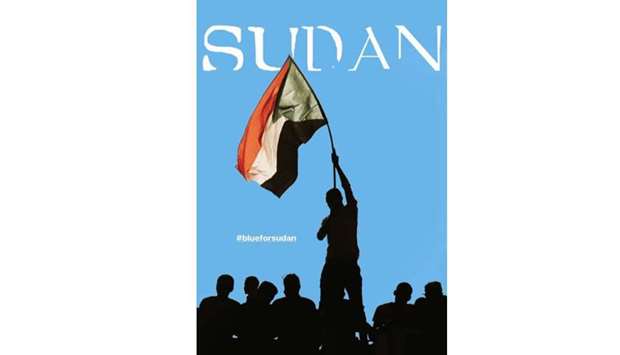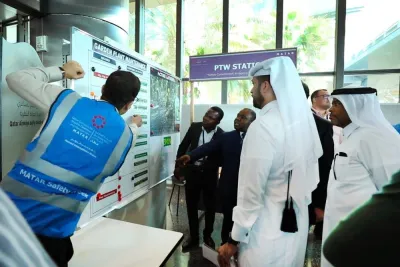HE Sheikha Al Mayassa bint Hamad al-Thani, chairperson of Qatar Museums, and a number of prominent people, in Qatar and beyond, on Wednesday pledged support to a new campaign, #BlueForSudan, to show solidarity with the people of Sudan seeking civilian rule.
They joined hundreds of thousands of people within and outside Sudan in changing their social media profiles to the colour blue in support of the initiative.
The Sudanese people have launched the campaign in view of the events taking place in their country, and one can express solidarity with them and their cause by changing the profiles on Twitter, Instagram and Facebook to light blue.
On her part, HE Sheikha Al Mayassa tweeted: "Stand with humanity, stand with Sudan — show solidarity by turning your profile to the colour blue!"
The colour blue was chosen as a mark of respect for a man named Mohamed Mattar, who was martyred during the sit-in massacre and whose favourite colour was reportedly blue.
In fact, he had changed his profile picture to blue before his death.
Mattar, a 26-year-old engineer and graduate of London's Brunel University, was shot by the Rapid Support Forces on June 3, reportedly as he attempted to shield two women from harm, Middle East Eye reported.
After he died, Mattar's family members and friends sought to remember and honour him through the colour blue.
It has now emerged as a symbol of Sudanese unity and the spirit of the martyrs, helping draw the world's attention to the Sudanese people's cause and revolution.
The campaign rapidly gained momentum and saw a huge response from social media users and activists from various countries.
Those pledging support to the initiative include prominent officials, media professionals and intellectuals from around the world, and #BlueForSudan soon became a major trending topic online.
Instagram’s story feature has been a key tool in raising awareness, with many people sharing details of the protests, particularly as Internet access has been intermittent in parts of Sudan since the protests started.
Both the profile pictures and the hashtag are being used as a symbol of solidarity with all Sudanese protesters, not only Mattar.
Sabah al-Haidous, CEO of Doha-based international social development organisation Silatech, expressed support for the initiative by changing her profile picture on Instagram to blue.
Similarly, several Qatari activists and social media users also announced their support for the campaign by changing their profile pictures on Twitter and Instagram into light blue.
According to reports, activist Safar al-Hajri, football player Hilal Mohamed al-Said, Sheikha al-Haidos, Khalifa bin Abdullah al-Khulaifi and a large number of activists and social media users also joined the initiative and more people were continuing to do so around the world.
A journalist with Al Jazeera, Haitham Abu Saleh, showed support for the people of Sudan by changing his profile and tweeting: "Stand with humanity, stand with Sudan."
Ramiz Mahjoub Khalil, a Sudanese-American activist, said: "The Internet has been shut down in Sudan and closed by the government to hide its massacres and crimes against civilians. Please change your profile picture and let the world know what is happening, we cannot be silenced."
Activist Thomas Van Linge, too, expressed solidarity by changing his profile picture on Twitter into blue.
"The Blue Nile people have suffered for years at the hands of the Sudanese regime and the thugs," he wrote.
The campaign intends to draw global attention to Sudan, where the military council continues to commit numerous abuses against Sudanese rebels and civilians.
Sudan has been led by a military council since the generals ousted veteran leader Omar al-Bashir on April 11 after months of nationwide protests against his three-decade rule.
After al-Bashir's fall, protesters remained encamped outside the military headquarters in Khartoum for weeks to demand civilian rule, until security and paramilitary forces moved in to disperse them on June 3.
Around 120 people have been killed since the crackdown began, according to doctors close to the protesters, news agency AFP reports.
The health ministry has acknowledged 61 people died nationwide.
The forces of the Declaration of Freedom and Change in Sudan suspended the civil disobedience and the temporary political strike, which they had called seeking the handover of power to civilians.
Shops and restaurants began to reopen in Sudan's capital Wednesday after demonstrators agreed to new talks, though many residents remained indoors after last week's deadly crackdown.
The apparent breakthrough in the standoff between the military rulers who toppled veteran leader al-Bashir and protesters demanding civilian rule followed mediation led by Ethiopian Prime Minister Abiy Ahmed, according to AFP.
Diplomatic efforts to resolve the crisis — triggered by the June 3 crackdown — got a boost as the US Assistant Secretary of State for African Affairs Tibor Nagy arrived in Khartoum on Wednesday, officials said.
Also, the US State Department nominated experienced Africa hand Donald Booth as a special envoy to Sudan Wednesday, hoping he could help craft a "peaceful political solution" between the military rulers and groups seeking civilian rule.
State Department spokesperson Morgan Ortagus said Booth was already at work, travelling with Nagy to Sudan "to engage with the parties".
Earlier, an Ethiopian envoy sent by Abiy had announced on Tuesday that the protest leaders and the ruling military council had agreed to resume talks and that a three-day civil disobedience campaign was ending.
The Sudanese people have launched the campaign in view of the events taking place in their country, and one can express solidarity with them and their cause by changing the profiles on Twitter, Instagram and Facebook to light blue.
On her part, HE Sheikha Al Mayassa tweeted: "Stand with humanity, stand with Sudan — show solidarity by turning your profile to the colour blue!"
The campaign comes amid the media blackout imposed by the military council in Sudan following the violent break-up of a sit-in, leaving scores of people dead and wounded.Stand with humanity, stand with Sudan— show solidarity by turning your profile to the colour blue! #BlueForSudan #NewProfilePic pic.twitter.com/ma0c23PXXA
— Al Mayassa Al Thani (@almayassahamad) June 12, 2019
The colour blue was chosen as a mark of respect for a man named Mohamed Mattar, who was martyred during the sit-in massacre and whose favourite colour was reportedly blue.
In fact, he had changed his profile picture to blue before his death.
Mattar, a 26-year-old engineer and graduate of London's Brunel University, was shot by the Rapid Support Forces on June 3, reportedly as he attempted to shield two women from harm, Middle East Eye reported.
After he died, Mattar's family members and friends sought to remember and honour him through the colour blue.
It has now emerged as a symbol of Sudanese unity and the spirit of the martyrs, helping draw the world's attention to the Sudanese people's cause and revolution.
The campaign rapidly gained momentum and saw a huge response from social media users and activists from various countries.
Those pledging support to the initiative include prominent officials, media professionals and intellectuals from around the world, and #BlueForSudan soon became a major trending topic online.
Instagram’s story feature has been a key tool in raising awareness, with many people sharing details of the protests, particularly as Internet access has been intermittent in parts of Sudan since the protests started.
Both the profile pictures and the hashtag are being used as a symbol of solidarity with all Sudanese protesters, not only Mattar.
Sabah al-Haidous, CEO of Doha-based international social development organisation Silatech, expressed support for the initiative by changing her profile picture on Instagram to blue.
Similarly, several Qatari activists and social media users also announced their support for the campaign by changing their profile pictures on Twitter and Instagram into light blue.
According to reports, activist Safar al-Hajri, football player Hilal Mohamed al-Said, Sheikha al-Haidos, Khalifa bin Abdullah al-Khulaifi and a large number of activists and social media users also joined the initiative and more people were continuing to do so around the world.
A journalist with Al Jazeera, Haitham Abu Saleh, showed support for the people of Sudan by changing his profile and tweeting: "Stand with humanity, stand with Sudan."
Ramiz Mahjoub Khalil, a Sudanese-American activist, said: "The Internet has been shut down in Sudan and closed by the government to hide its massacres and crimes against civilians. Please change your profile picture and let the world know what is happening, we cannot be silenced."
Activist Thomas Van Linge, too, expressed solidarity by changing his profile picture on Twitter into blue.
"The Blue Nile people have suffered for years at the hands of the Sudanese regime and the thugs," he wrote.
The campaign intends to draw global attention to Sudan, where the military council continues to commit numerous abuses against Sudanese rebels and civilians.
Sudan has been led by a military council since the generals ousted veteran leader Omar al-Bashir on April 11 after months of nationwide protests against his three-decade rule.
After al-Bashir's fall, protesters remained encamped outside the military headquarters in Khartoum for weeks to demand civilian rule, until security and paramilitary forces moved in to disperse them on June 3.
Around 120 people have been killed since the crackdown began, according to doctors close to the protesters, news agency AFP reports.
The health ministry has acknowledged 61 people died nationwide.
The forces of the Declaration of Freedom and Change in Sudan suspended the civil disobedience and the temporary political strike, which they had called seeking the handover of power to civilians.
Shops and restaurants began to reopen in Sudan's capital Wednesday after demonstrators agreed to new talks, though many residents remained indoors after last week's deadly crackdown.
The apparent breakthrough in the standoff between the military rulers who toppled veteran leader al-Bashir and protesters demanding civilian rule followed mediation led by Ethiopian Prime Minister Abiy Ahmed, according to AFP.
Diplomatic efforts to resolve the crisis — triggered by the June 3 crackdown — got a boost as the US Assistant Secretary of State for African Affairs Tibor Nagy arrived in Khartoum on Wednesday, officials said.
Also, the US State Department nominated experienced Africa hand Donald Booth as a special envoy to Sudan Wednesday, hoping he could help craft a "peaceful political solution" between the military rulers and groups seeking civilian rule.
State Department spokesperson Morgan Ortagus said Booth was already at work, travelling with Nagy to Sudan "to engage with the parties".
Earlier, an Ethiopian envoy sent by Abiy had announced on Tuesday that the protest leaders and the ruling military council had agreed to resume talks and that a three-day civil disobedience campaign was ending.



